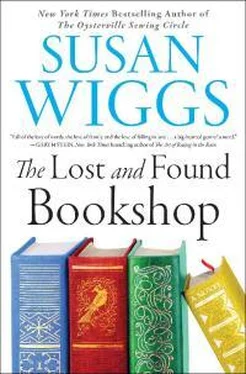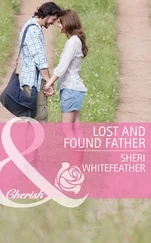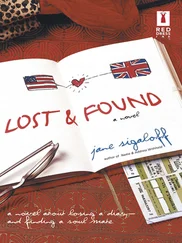“You can take your time and let me know how you want to proceed,” said Peach.
“I will. Thanks for helping today. I’ll call you, okay?”
“Sure.” He dug his keys from his pocket and then paused, studying her face and looking as if he could read her thoughts. “Once again, I want to say I’m real sorry about your mom. Nothing quite prepares you for something like this.”
She looked at his eyes, soft and thoughtful, like Dorothy’s. “It’s hard to describe. The sadness feels so . . . pervasive. It takes up all my headspace, and I’m supposed to be taking care of things. The shop. The building. My grandfather.”
“If you want to put off the work for a later time, we can do that.”
“No.” She was surprised at how quickly that came out. “I mean, these things are not going to get better on their own, right?” She knew the repairs wouldn’t be cheap, but she had money put by. Her savings. She could sell her car, which was a liability in the city anyway, impossible to park. And the damned diamond ring she would never, ever wear, because it was an albatross of guilt. She could cash in her 401(k), the retirement fund she’d been nurturing since the day she’d landed her first grown-up job. Not so long ago, that would have been unthinkable. Now it seemed like the best option.
You’re young , she told herself. You’ll replace those funds once you . . . What? That was the trouble. Once the shop was profitable? When would that happen?
“Can you get started on my grandfather’s apartment?” she asked Peach. “I worry about him. He’s . . . ever since he broke his hip and then got back from rehab, it seems like he’s aging so fast.”
“Sure. I’ll get right on that.”
Natalie studied the list she’d found in her mother’s handwriting. “God, I wish I could talk to my mom. Do you talk to your mother, Peach? Because if you don’t, you should. And if you do, you should do more of it. When I think of all the conversations Mom and I could have had . . .” She shook herself. “Sorry—”
“Don’t be. This must be really damn hard.”
“It . . . yes. The building is only part of it. I need to figure out how to help my grandfather. If it was just his hip, I’d know how to help. But the other symptoms are so unpredictable. Every day, I wonder what he’ll forget, or if a memory will come back to him. What if he forgets who I am? Or worse—what if he forgets who he is?” She felt like babbling on, but stopped herself.
Peach was quiet for several seconds. “I’ll be back first thing in the morning,” he said. “If that works for you.”
“Yes. And . . . thank you for coming.”
He hoisted himself into the truck. “Yep. You take care now.”
The day ended as it had begun, with her standing at the curb in tears in a cloud of diesel exhaust from Peach Gallagher’s truck.
10
After the divorce, Peach had ended up with only his work truck for a vehicle, and Dorothy had insisted on being dropped off for school on the corner rather than in the carpool pull-through. Eventually, he’d persuaded her to explain why, and she’d shamefacedly confessed that certain kids made fun of her for arriving at school with a “workman.”
Yet another dart from Regina, whose biggest complaint in the marriage had been not having enough. They didn’t make enough money. The house wasn’t big enough. The car not new enough. The school not exclusive enough. The husband not ambitious enough.
Discovering her affair with Regis should not have surprised Peach. Should not have laid him flat. Regis was getting his MBA. Regis was going places. Regis was going to give Regina the life she deserved.
And stuck in the middle of her mother’s discontent and her father’s desperation was Dorothy, objectively the best kid in the world. Neither he nor Regina deserved her. The parenting plan had them dividing their time with surgical precision, down to the minute, so he dedicated himself to giving this incredible little person the best he had. That included parking the truck and walking inside with her.
Friends asked him why he didn’t find a cheaper place to live outside the city. Why he lived with his bandmates, Suzzy and her husband, Milt, in a neighborhood where rent was charged seemingly by the square inch, where he had to juggle two jobs and share housing just to make ends meet. The answer was simple. The answer was right here next to him, holding his hand.
She bounced along, nattering away about koala bears, the topic of her science report. A koala’s not actually a bear but a marsupial. It eats only eucalyptus leaves—two pounds a day. A koala’s fingerprints are indistinguishable from human fingerprints.
“You don’t say,” he remarked. “That’s cool.”
“Did you tune my uke for me?” she asked. The tiny instrument was tucked in its case in her backpack.
“I taught you how to tune it yourself,” he said.
“What if I get nervous at Show and Tell and forget?”
“You won’t forget. And what’d I tell you about getting nervous?”
“Breathe, slow down, and remember I play like a boss.”
“Exactly. You’re gonna dominate Show and Tell.”
“Can we do something fun after school today?”
“Heck yeah.” He lifted his face to the sky. Autumn was San Francisco’s summer. The days were bright and warm, scented with drying leaves and fading flowers and the ever-present salt air. He tried to knock off work early on the days he had Dorothy. “How about we go get you a kite in Chinatown and take it up to Kite Hill?”
“Yes! Yes yes yes yes yes .” She danced in a little circle around him.
He nodded a greeting to Amber’s mother, who was single and kept wanting to go for coffee. Thanks, but no, nice lady , thought Peach. Since the divorce he’d gone out with a few women—enough to convince him he wasn’t ready to hand his heart over to somebody.
“Got your lunch?” he asked Dorothy.
“In my backpack.”
“Library book? Permission slip? Water bottle?”
“Yep. Yep. Yep.”
“Okay then. Love you, squirt.”
“See you when I come back around,” she said. Her smile lit the world even as her words broke his heart. See you when I come back around.
* * *
Natalie struggled up the hill with her grandfather in his wheelchair. She was learning to find accessible routes to their favorite places, but this one might be a fail. She was determined, though. Getting out and about seemed to be good for his head.
Dr. Yang was concerned about symptoms that appeared unrelated to Grandy’s dementia—digestive issues, respiratory troubles. He was bringing in more specialists and ordering more tests. He had shown her pictures of Grandy’s brain. He’d given her brochures with information about the different types of dementia and the path it might take, none of them encouraging. He’d increased the dosage of meds for the condition and scheduled another appointment. The pills might decelerate the process, but her grandfather’s memory was in danger of being slowly erased.
Sometimes he woke in such a state of disorientation he couldn’t find his way to the bathroom. Other times he insisted his dinner tasted like scrap metal and that he heard the wind in his ears.
The doctor encouraged her to do normal things with him, to help him keep the chaos in his mind at bay.
Grandy himself sometimes seemed to understand what was happening to him. He said he wanted to stay “intact,” and she understood that to mean he didn’t want to sell the building and try to create a new life for himself somewhere else.
She stopped in front of Corona Jewelry & Loan. There was a sign on the door: quick cash—no credit check. She stood for a moment, studying their reflection in the plate glass. She looked small behind the wheelchair, curls escaping her beret and her cheeks red from exertion. Grandy sat calmly, studying the window display.
Читать дальше












